“Australian’s all let us rejoice, for we all love a beer.” With alcohol being so deeply embedded in Australian culture, you could be forgiven for believing that it features in our national anthem.
With Australia Day being one of the nation’s most celebrated holidays, alcohol related hospital admissions sky-rocket over the long weekend[i]; reflecting a national drinking habit so normalized we applaud it[ii].
Our Australian sporting heroes celebrate their biggest wins (and losses) with an alcohol-fueled after-party. In 2015, Shane Warne told fans “he and the boys couldn’t wait to get on the booze” after winning the International Cricket World Cup[iii]. The team had not yet left the field, and Shane was boasting about the big drinking session that was to come. Viewers around the country barely questioned it – many agreeing that they too would do the same.
Tony Abbott MP admitted to missing multiple crucial votes in Parliament as ‘he was too drunk to make it to the chamber’ in 2009[iv]. “I think quite a few bottles of wine were consumed by the three of us,” Mr Abbott said. He proceeded to lead the country as Australia’s Prime Minister four years later.
Business leaders understand that alcohol is a central and often necessary component to a networking event. A former businessman, now landscape architect, commented that “the more you drink, the better you connect in the business world.”
This is often important when trying to win a client, close a deal, or simply make a good impression.
“You can only imagine how much you can drink when you host a potential client to eighteen holes of golf,” he jokes.
However, the dangerous consumption of alcohol is more than a joke – it is a condition that affects millions of Australians on a daily basis. Recent statistics show that 24 percent of Australian men exceeded the lifetime risk guideline[v] for alcohol intake in 2016-17[vi]. Similarly, other research has shown that one in three Australian females drink at levels harmful to their health. Statistics reported by The Huffington Post reported that 78 percent of people believe that Australia has an unhealthy relationship with alcohol, and a similar percentage of people believe that this issue will only worsen over the next ten years[vii]. The Foundation for Alcohol Research and Education found that approximately “one million Australian’s drink, on average, eight standard drinks a day”[viii] – four times the lifetime risk guideline.
Despite these staggering statistics, it seems that the widespread social acceptance of alcohol in Australia means that the harms of misuse or addiction are easily overlooked. The language and approach of public health campaigns allows us to distance our own personal experience, reducing any acknowledgment of our own unhealthy relationship or substance misuse[ix].
Senior Psychologist at The Banyans, Peter Hayton, acknowledges that underlying causes of regular alcohol consumption may never be realized, as Australian culture tends to justify drinking for any number of reasons. “A wedding, a graduation, a birthday, a hard day at work, a good day at work. When you are experiencing an alcohol dependency, either physically or psychologically, it can be easy to overlook the underlying reasons for your consumption, and say, “It’s what everyone else does.”
The perception of regular (and often excessive) alcohol consumption in Australian culture has created a mindset among Australian society: those seeking help for alcohol misuse is surely unusual, and there must be secretive behaviors characterizing an addiction over regular alcohol intake.
However, Peter explains that secretive behaviors surrounding alcohol consumption are not necessarily required for the presence of an alcohol addiction, misuse or dependency.
“It’s a common feature, but not a required criteria,” he says.
Other warning features to look for when considering your relationship with alcohol include:
- Feeling guilty or ashamed about your drinking habits
- Friends or family express concerns about how often, or how much, alcohol you are drinking
- You feel like you cannot relax, or enjoy yourself without consuming alcohol
- Experiencing memory lapses, or ‘black out’ due to the amount of alcohol you consumed
- You often intend to have one beverage, and end up drinking more than planned
If one or more of these features are present for you, it is likely that you may be experiencing alcohol misuse or dependency. As with many other experiences – such as compulsive gambling, disordered eating or drug addiction – there is always a path to rehabilitation and recovery.
Addiction Medicine specialist, Dr Christian Rowan, reminds people to always seek guidance from a healthcare professional before undertaking an attempt at detox. Medical complications can occur if a physical dependency to alcohol has developed, and may cause serious damage or even death. Similarly, Dr Rowan highlights the necessity for a biopsychosocial support network if recovery will be successful. This support team may include medical professionals, psychotherapists, allied health professionals, friends and family.
The Banyans Health and Wellness Residence is a comprehensive rehabilitation program for discerning individuals who seek change in their lives. Alcohol misuse or addiction is one the many areas in which The Banyans individualized programs can provide the opportunity for incredible life-long recovery. If you or someone you care about could benefit from The Banyans approach, please call +61 1300 BANYAN (1300 226 926) or complete an online enquiry here.





